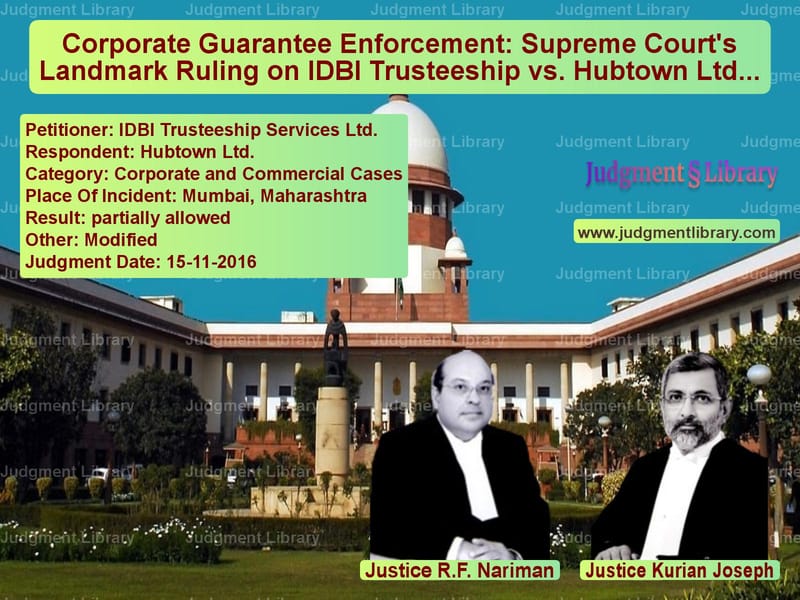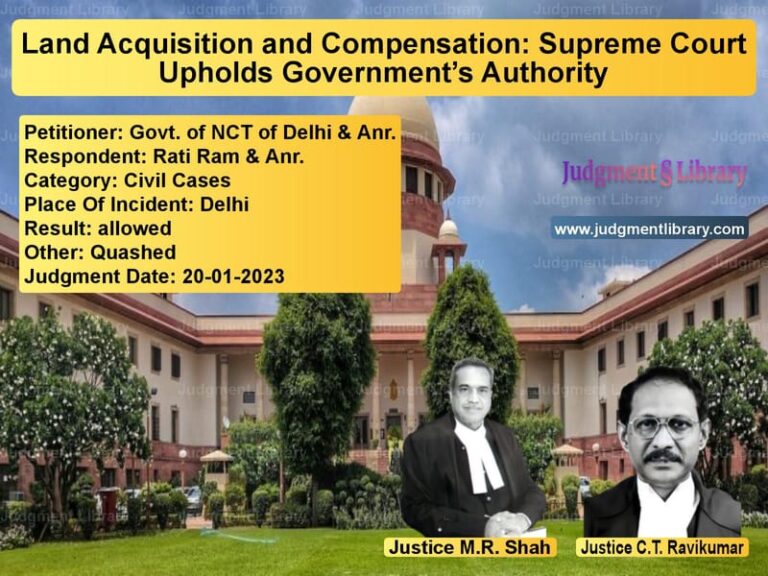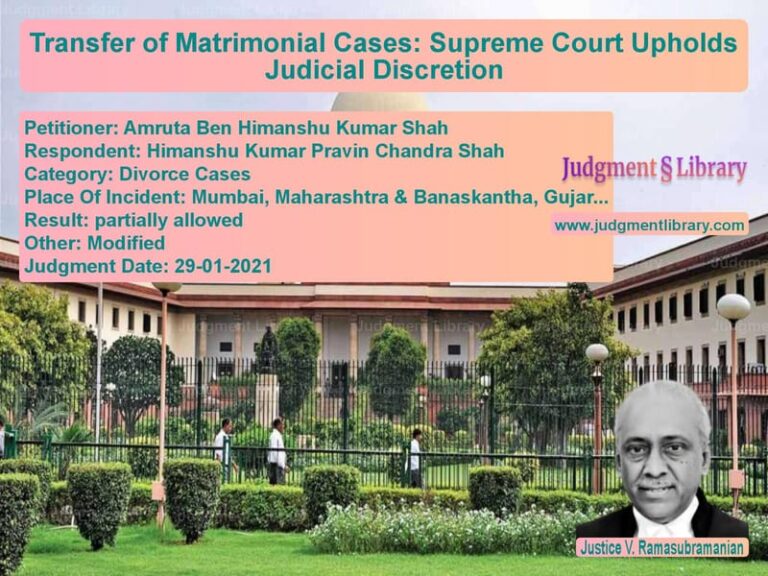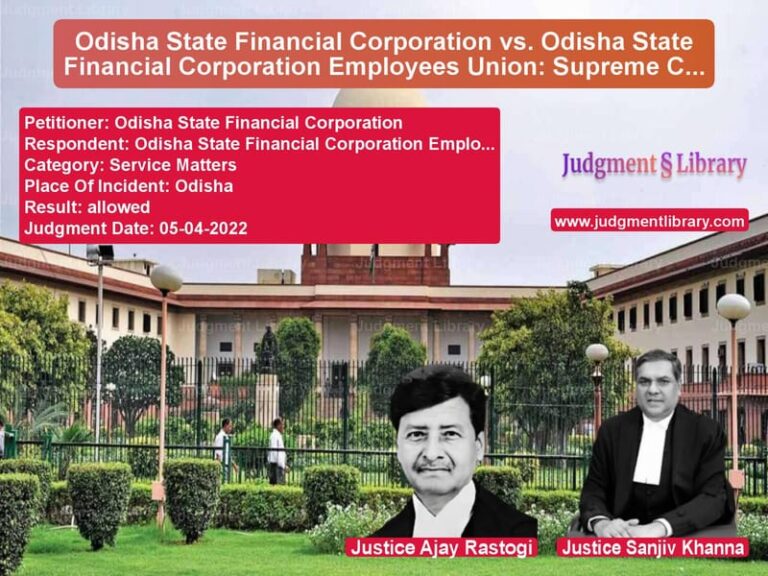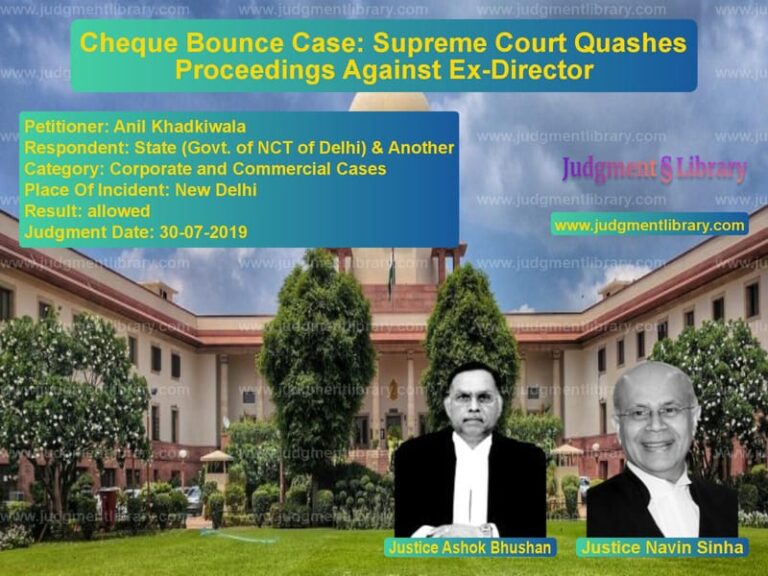Corporate Guarantee Enforcement: Supreme Court’s Landmark Ruling on IDBI Trusteeship vs. Hubtown Ltd.
The Supreme Court of India delivered a significant ruling in the case of IDBI Trusteeship Services Ltd. vs. Hubtown Ltd., addressing the enforcement of a corporate guarantee issued by a real estate developer. The case revolved around financial transactions structured through debentures and guarantees, raising important questions on foreign direct investment (FDI) compliance under the Foreign Exchange Management Act (FEMA) and the legitimacy of contractual obligations.
The case was brought before the Court by IDBI Trusteeship Services Ltd., acting as a debenture trustee for financial arrangements involving Vinca Developer Pvt. Ltd., a subsidiary of Hubtown Ltd. The appellant sought to enforce a corporate guarantee provided by Hubtown Ltd. after defaults occurred in payment obligations.
Background of the Case
The case originated from financial transactions involving:
- FMO, a Dutch financial institution, which invested in equity shares and compulsorily convertible debentures (CCDs) of Vinca Developer Pvt. Ltd.
- Vinca’s investment in optionally partially convertible debentures (OPCDs) of Amazia Developers Pvt. Ltd. and Rubix Trading Pvt. Ltd.
- Hubtown Ltd., which owned a significant stake in Vinca and issued an irrevocable corporate guarantee to secure financial obligations.
When the debt obligations remained unpaid, IDBI Trusteeship sought to enforce the corporate guarantee, leading to a legal battle over its validity.
Key Legal Issues
The Supreme Court examined the following major questions:
- Whether the structured financial transaction violated FEMA regulations and was against public policy.
- Whether the corporate guarantee issued by Hubtown Ltd. was enforceable.
- Whether the defendant, Hubtown Ltd., should be granted leave to defend the summary suit.
Petitioner’s Arguments
IDBI Trusteeship Services Ltd. contended:
- The corporate guarantee was absolute and irrevocable, and Hubtown Ltd. was obligated to honor its terms.
- The transactions were structured in compliance with FEMA, and the enforcement of the guarantee did not involve any unlawful repatriation of funds.
- Hubtown Ltd. had willingly undertaken the guarantee and could not renege on its obligations.
- The defense raised by Hubtown Ltd. was frivolous and aimed at delaying legal proceedings.
Respondent’s Arguments
Hubtown Ltd. defended itself by asserting:
- The entire transaction was a colorable device to bypass FEMA regulations, ensuring a fixed return for FMO contrary to Indian law.
- The structure involved routing FDI into a township development project through OPCDs, effectively providing a guaranteed return, which is not permitted under FEMA.
- Since the entire transaction was tainted with illegality, the corporate guarantee should not be enforced.
- The case involved complex financial and regulatory issues, and Hubtown Ltd. should be granted unconditional leave to defend the suit.
Supreme Court’s Observations
The Court carefully analyzed the legality of the financial structure and the enforceability of the corporate guarantee. It made the following key observations:
1. Compliance with FEMA Regulations
The Court noted that:
- FMO had invested in Vinca through convertible debentures, which was permitted under FEMA.
- Vinca’s subsequent investment in OPCDs of Amazia and Rubix raised concerns, as these instruments offered fixed returns.
- However, the issue of whether the transaction violated FEMA regulations required further examination at trial.
2. Validity of the Corporate Guarantee
The Court observed that the guarantee was explicitly unconditional and irrevocable. The guarantee clearly stated that Hubtown Ltd. had undertaken to ensure that Amazia and Rubix would meet their payment obligations. There was no argument from the respondent that the guarantee had been invoked incorrectly.
3. Granting Leave to Defend
The Supreme Court applied the principles governing summary suits under Order 37 of the Civil Procedure Code. It held that:
- Hubtown Ltd. had raised a plausible but improbable defense, requiring it to be put on terms before defending the suit.
- Leave to defend should be granted only if Hubtown Ltd. deposited Rs. 418 crore (the principal sum claimed) or provided security for the amount.
- If Hubtown Ltd. failed to comply, the plaintiff would be entitled to summary judgment.
Final Judgment
The Supreme Court ruled in favor of IDBI Trusteeship Services Ltd., holding that:
- The corporate guarantee was enforceable.
- The case should proceed to trial only if Hubtown Ltd. deposited Rs. 418 crore or provided security.
- The suit should be disposed of within one year.
Judgment Outcome: Leave to defend granted conditionally.
Don’t miss out on the full details! Download the complete judgment in PDF format below and gain valuable insights instantly!
Download Judgment: IDBI Trusteeship Ser vs Hubtown Ltd. Supreme Court of India Judgment Dated 15-11-2016.pdf
Direct Downlaod Judgment: Direct downlaod this Judgment
See all petitions in Corporate Compliance
See all petitions in Bankruptcy and Insolvency
See all petitions in Shareholder Disputes
See all petitions in Judgment by Rohinton Fali Nariman
See all petitions in Judgment by Kurian Joseph
See all petitions in partially allowed
See all petitions in Modified
See all petitions in supreme court of India judgments November 2016
See all petitions in 2016 judgments
See all posts in Corporate and Commercial Cases Category
See all allowed petitions in Corporate and Commercial Cases Category
See all Dismissed petitions in Corporate and Commercial Cases Category
See all partially allowed petitions in Corporate and Commercial Cases Category

